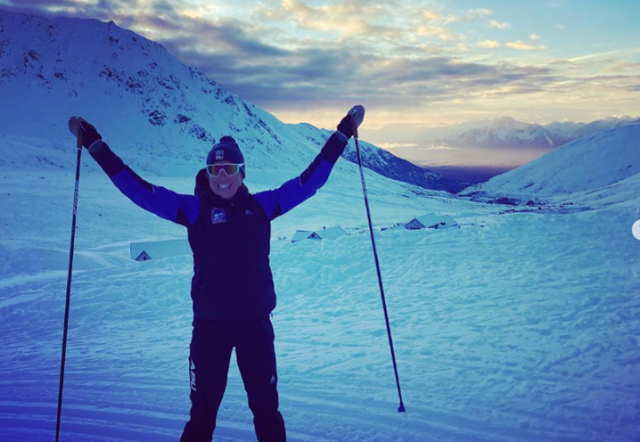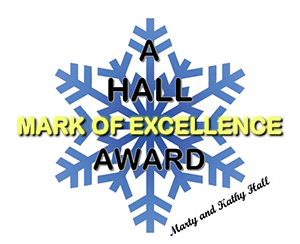 This coverage is made possible through the generous support of Marty and Kathy Hall and A Hall Mark of Excellence Award. Learn more about A Hall Mark of Excellence Award—or about supporting FasterSkier coverage—by contacting info@fasterskier.com.
This coverage is made possible through the generous support of Marty and Kathy Hall and A Hall Mark of Excellence Award. Learn more about A Hall Mark of Excellence Award—or about supporting FasterSkier coverage—by contacting info@fasterskier.com.
FasterSkier concludes its interview with Stifel U.S. Ski Team member, Rosie Brennan (Part I, Part II). In Part III, Brennan continues to share her candid thoughts regarding her future, the financial and personal strains of being a professional athlete, and her complicated relationship with social media.
This interview has been lightly edited for clarity and brevity.
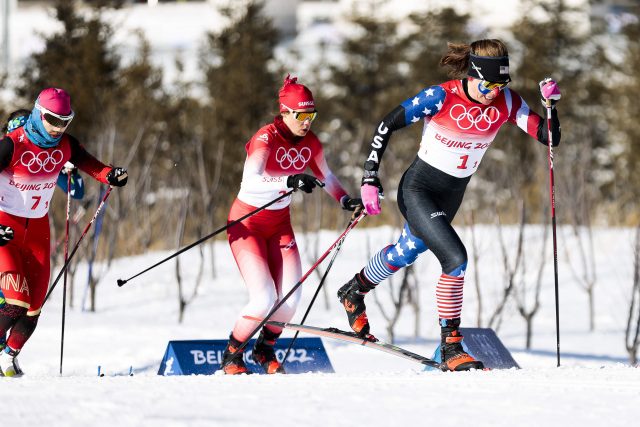
FasterSkier: Looking a little further down the road to 2026 in Cortina, you’ll be 39. Have you given any thought to whether you’re going to want to stay with ski racing until then?
Rosie Brennan: I probably give it too much, honestly. I did deep back and forth within my head so much about that and, to be honest, I don’t have an answer. I’m kind of at the place in my career where, if for one reason or another I had to quit tomorrow I would be very satisfied. I’m very proud of everything I’ve done, and I feel like I’ve had a very fulfilling career … I don’t really have regrets about it. I still love the challenge of racing, and I love putting those challenges in front of myself and seeing what’s possible. This past season, I really enjoyed racing so it’s kind of the fun part now I guess. But I definitely also feel the pressures of other things I want to do in life. I’m always weighing those back and forth. I’m going to race this season and we’ll see what life brings or how my motivation changes or doesn’t change throughout the season.
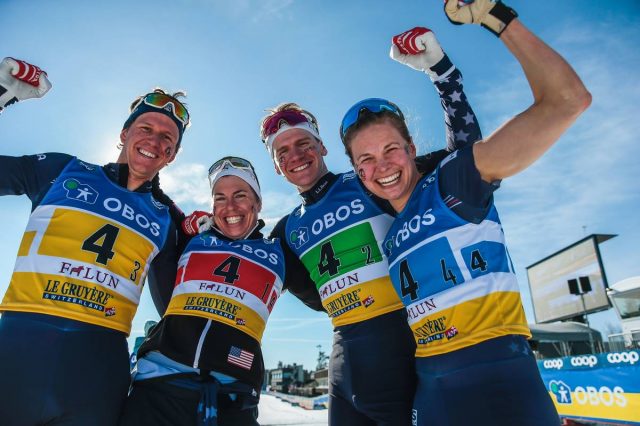
FasterSkier: Could you share the challenges of being a full-time professional ski athlete that you don’t think the general public is aware of: the challenges you face that don’t get addressed?
Rosie Brennan: Financially; that’s probably one that does get addressed to some extent and is more obvious. But there is definitely a hurdle, particularly when you first make the World Cup where it’s very expensive and you’re not really making money yet. Making it through that time period is definitely challenging, and I think where a lot of people turn away, maybe sooner than they should.
Then, particularly as a US athlete, the challenge of spending that much time in Europe … in a hotel. It’s hard. People are probably like, “Oh, poor you—you have to spend all the time traveling in amazing places!” But it’s a skill, and it takes time to learn it and I think so often we expect someone to just go to the World Cup and immediately be good, because that’s what you see Norwegians do or Swedes do. I think it’s a totally different thing for Americans because it’s not just that you’re learning the skill of racing on the World Cup, but you’re also learning the skill of living in Europe for that amount of time and traveling; and it is definitely a skill set. Giving people some patience to figure that out is often undervalued.
And being a female, there’s still the cultural pressures of having a family and I think that’s definitely a very strong uphill battle culturally that I face, every day. Especially for a sport where you probably don’t peak until your 30’s. We see that not just from someone who started late like me, but even with the Europeans you see that. I think that’s definitely a challenge that’s under-appreciated on the female side.
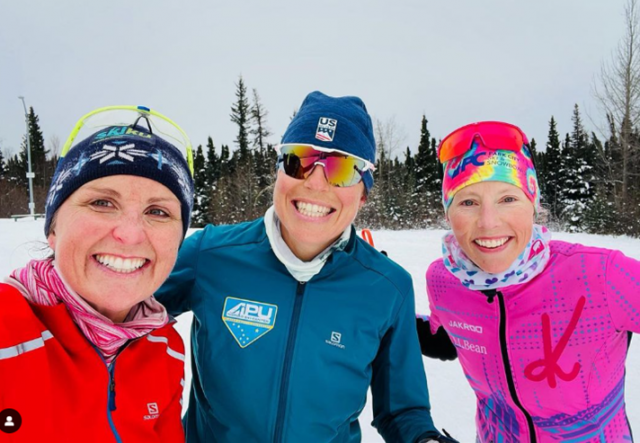
FasterSkier: At least now though, you have models for how it’s been done with, Kikkan and Marit Bjorgen both successfully integrating motherhood into a racing career.
Rosie Brennan: For sure. And that is really cool that there have been so many people to do it. I’m still astounded with what Kikkan did in that sense because for an American, when you do have to spend the whole season in Europe, it’s a whole other thing. You need the finances to move an entire family to Europe and you need the support to do so with humans … to have childcare and all that sort of thing. It’s way different than like a runner doing it, that just leaves a weekend every month to go do a race. Even Marit, she was just leaving for the weekend every couple of weeks. The scope of what we face in that sense is just much larger than people give it credit for.
FasterSkier: Last winter when you had illness early in the season you expressed the difficulty of having to balance being a professional athlete and getting paid by your race performance versus guarding your health and being able to prolong your season.
Rosie Brennan: It is really challenging. Everyone goes about it very differently. I’m not a huge fan of social media. I don’t really love being in the spotlight or producing a bunch of material for myself and that sort of thing. So that’s has been a struggle for me. As a result, I relied largely on my racing to make money. It’s been very successful so I can’t really complain that much, but it does put this unique pressure on you. In some ways it makes me feel that I have more control over it because if I do my training well and I prepare well, I believe that I will make money. But on the flip side, life does happen and things happen and if your income is solely dependent on win schedules and prize money, if you do end up sick and you don’t race for a month; that’s a huge hit, versus having some sort of a social media contract that you can do regardless of whether you’re racing or not. I definitely recognize that I’ve largely put that burden on myself. It can also be challenging for certain personalities or certain types of people. So that is a battle.
With the new points system in the World Cup, it really benefits you to do as much racing as you can. That puts you in this place where you are questioning, “Should I just do this race even though I’m maybe not 100% healthy?” Because I need to get the points, because that equals money at the at the end of the season. So, it is a balancing act, and I don’t think we’re the only sport to face that. I think that’s a big thing in running too. That’s worth talking about in sports and maybe prioritize health at the same time for athletes.
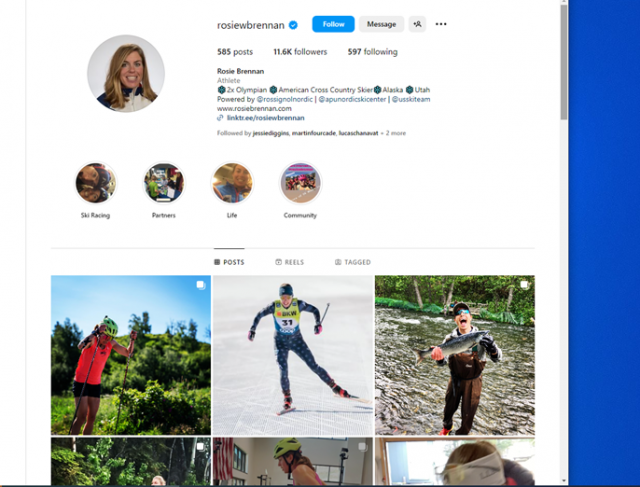
FasterSkier: Do you find yourself under pressure from sponsors to engage more in social media?
Rosie Brennan: Maybe a little bit. I honestly don’t have sponsors outside of skiing like that. I just have my equipment sponsors basically. I feel more like a cultural pressure of this is how you make money, so you should probably start producing content that other companies want to come in and sponsor you to pay you for your content.
FasterSkier: It’s an interesting perspective coming from someone of your generation.
Rosie Brennan: I don’t think it’s that’s unique. I know there’s some of the young 20-something people on the national team that feel the same way about it, so I don’t even know if it’s really that much of a generational thing. I don’t even think I totally understand how social media works, and I think that’s why I hate it so much. I often feel guilty posting because I think I’m just contributing to the problem, and that’s kind of my worst nightmare. That’s not the type of role model I want to be, and I personally believe it’s just a really bad thing for people in general and for society. I hate how much time I spend on it as it is, and so the last thing I want to do is carve out hours of my day to spend more time doing it and then therefore also asking all my followers to also spend more time on it because I’m producing more content. It’s honestly a moral dilemma for me. But I also know that there are some younger people on the team that feel the same way. It’s definitely a challenge because companies see the value in it, and they want to leverage it to make money and we have to make money too. I guess that’s part of my job.
FasterSkier: What’s the thing you like least about being on the road for so long, and the thing you like best.
Rosie Brennan: The thing I like least is just missing my friends and family so much. And the thing I like the most is getting to see so many people and getting to see so many new places.
FasterSkier: When the time comes that you end professional ski racing, do you see yourself carrying on in skiing in some capacity?
Rosie Brennan: I have been putting some thought into that. I’ve been involved in sport for so long that I can’t really imagine not being involved on some level. How big of a level? That I don’t know. We’ll have to see, but I definitely would like to be involved in high level sport on some level in my next career. I don’t know if that would specifically be cross-country skiing or another sport. But yes, I would like to stay involved to some extent.
